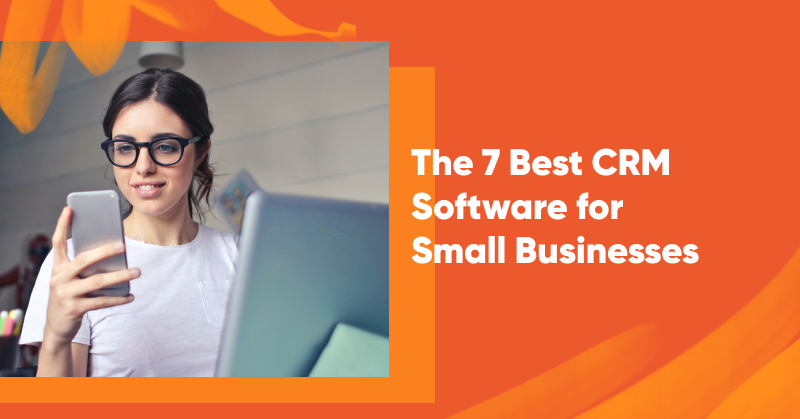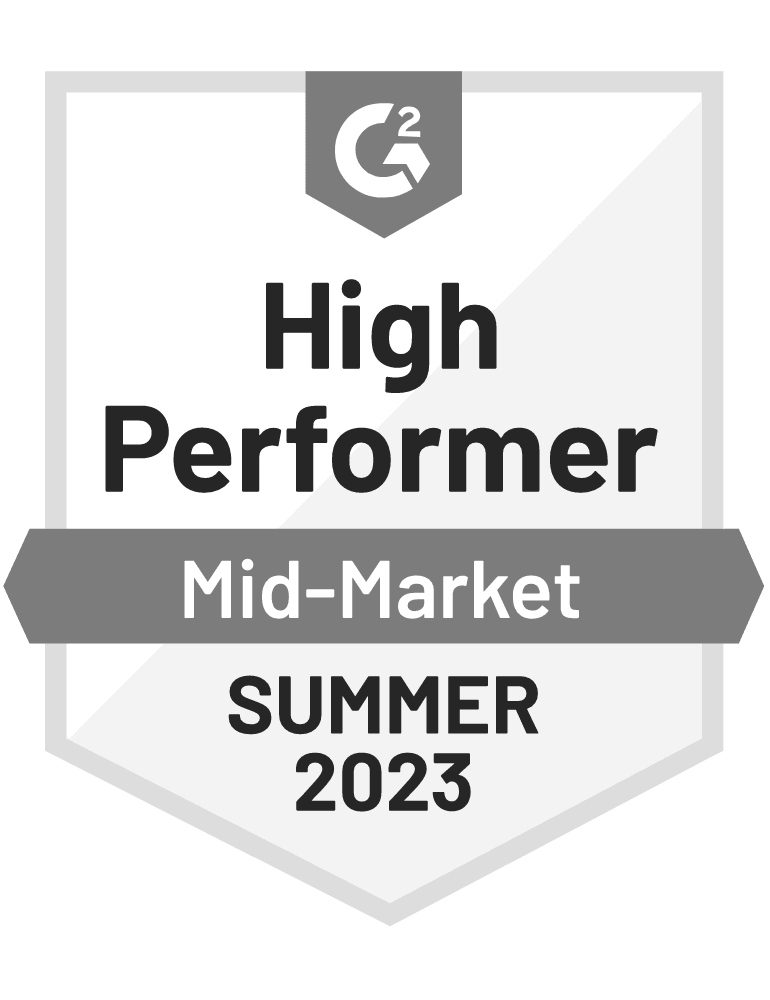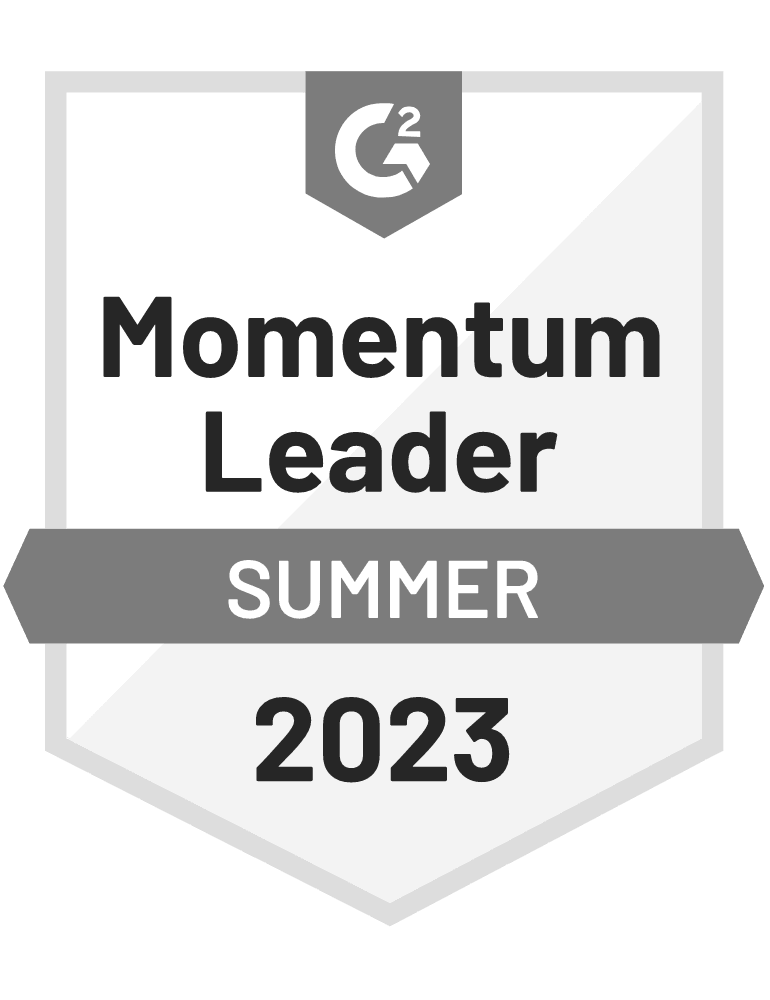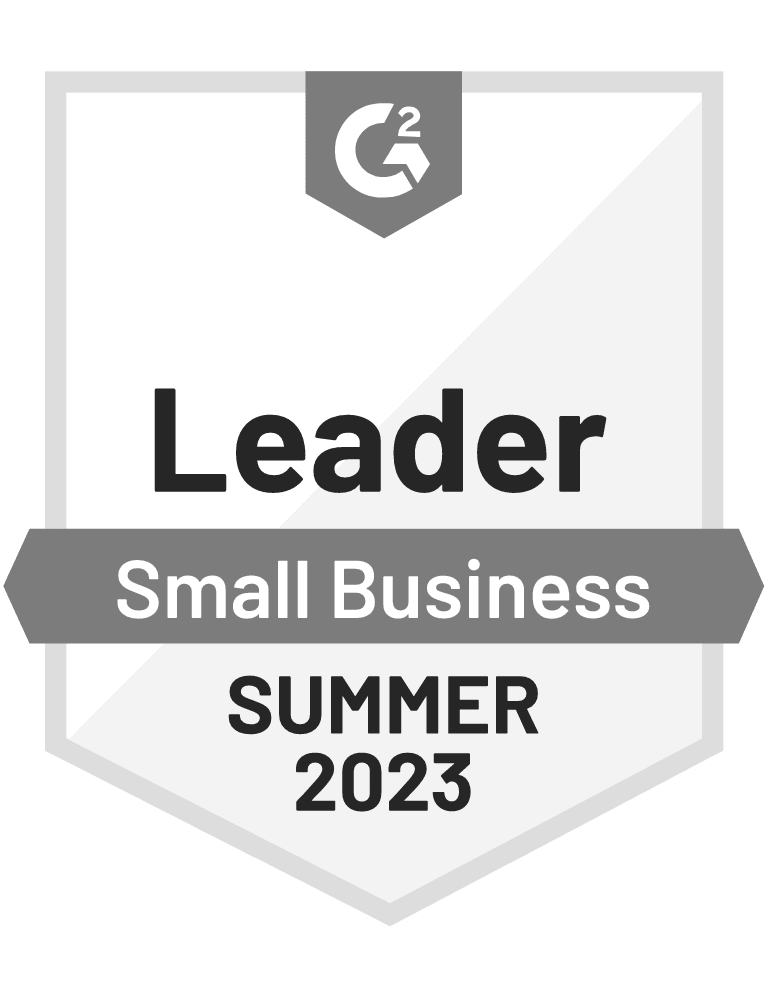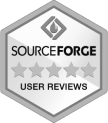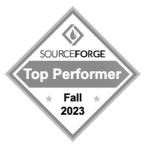Customer relationship management software is an essential part of any business. You should have a data management hub that tracks your company’s interactions with current and future customers.
What does this look like? Well, a customer relationship management (CRM) system can be as simple as the contact list on your phone or a spreadsheet of customers your sales teams have called.
Modern CRM systems have more complex capabilities, like recording transactions, tracking sales, sending automated sequenced emails to leads, and more. These features allow small businesses to use customer data and an automated sales process to manage leads and boost sales.
That means CRM tools are an essential small business software. If you’re just starting out, you can choose to use basic CRM software to help you get started. Then as you grow, you can tackle more complex CRM solutions that are tailored to your growing business.
In this article, you’ll learn about the best small business CRMs on the market. Use this information to choose the best CRM software for your business in 2024 and beyond.
Let’s jump right in!
How can CRM solutions help?
Did you know that 66% of customers can’t remember the last time a company exceeded their expectations?
That figure highlights just how many companies do the minimum or fall very short of expectations when it comes to customer relationships. The right CRM software helps you tap into customer communication opportunities to “wow” your audience.
Let’s look at Apple’s CRM as an example of a growth strategy.
If you’ve used an iPhone, a Mac, or an iPad, you’ll be familiar with the Apple ID. This unique ID syncs across a multitude of devices, saves your movie/music preferences, and gives you tailored recommendations based on your taste.
Why? To give you the most convenient, enjoyable experience possible. Another big benefit of this ID for Apple is that it gives them regular insights into customer preferences, which can be used for effortless targeted marketing. Furthermore, all this customer data is shared with their customer service teams to help them provide the best experience.
That’s the power of a comprehensive CRM system. It manages your customers (present and future) and frees up your time so you can focus on other business growth activities.
How to choose the best CRM system?
When trying to find the perfect CRM software for your business, consider answering these questions:
1. What’s your goal?
Different CRM systems have different strengths and weaknesses when it comes to solving problems that small businesses tend to encounter. To know what you should focus on, try to figure out where you’re having issues with your customer communications.
Is your sales team having trouble keeping track of your leads? Then you should use CRM software that has good lead management features. This will speed up the sales process.
Or maybe you’re having trouble following up with your customers using email marketing? Many CRM systems have great email templates that you can use to create email marketing campaigns.
2. Who will be using the contact management software (and for what)?
Different members of your team probably have different levels of technological know-how. Make sure that your CRM solution isn’t too complicated for your employees to use.
On the other hand, if you have some tech-savvy employees, you can choose a system that has higher CRM capabilities but might be more difficult to use. But make sure you prioritize the health and efficiency of your workers by integrating a health roster and providing them with the support they deserve.
3. What are the most important features?
The wide range of CRM features can get confusing. Our advice for small companies is to avoid getting too caught up in all of them and instead focus on the features, especially task management software features, that are going to be most important for your business.
After all, those are the CRM features you’ll use!
4. What’s your budget?
Budgets are always an important consideration for small businesses. While CRM pricing varies depending on the available features and package plans, you should consider your CRM software as an investment, and you should aim to make more in revenue as a result of the CRM functionalities than the amount you’re spending on it.
7 best CRM for small businesses for 2024
Once you’ve answered these questions, it’s time to start considering your options! This list is designed to help you to find the best CRM software for your business.
If you’re short on time, here’s a tl;dr of the best CRM software to try out:
- Hubspot is a free CRM option that offers plenty.
- Zoho is a feature-rich CRM for scaling.
- Drip has a clear focus on ecommerce sales pipelines.
- Salesforce is a veteran CRM vendor and can do everything.
- Streak CRM for Gmail can be managed from your Gmail account with no separate software.
- AgileCRM is all-in-one at an affordable price.
- Insightly has great project management tools.
Now let’s take a look at each of these in more detail!

Why is Hubspot a “best CRM for small business” candidate?
HubSpot is an innovative company behind a lot of powerful marketing and sales software. Their small business CRM software is no different.
The CRM system offers a clean user interface that lets you see the entire sales pipeline CRM (or even multiple sales pipelines) directly from the dashboard.
You can easily integrate the HubSpot CRM with over 200 apps and services such as WordPress, lead generation software, email marketing tools, and more!
Pricing:
A forever-free plan with limited features is available for their CRM, Marketing, Sales, and Service Hubs. For more features and added capabilities, prices start at $50/month per user. You can also upgrade to the Growth Suite starting at $113/month per user.
Core features:
- Personalized email templates and sequences for leads and existing customers
- Real-time notifications on lead behavior and the sales process
- Seamless third-party integrations with tools like Shopify and Salesforce
What could be improved:
The only real cons for this CRM software is that pricing can start piling up when premium features are added.
The free Hubspot CRM software is a great option for small businesses without a big budget.
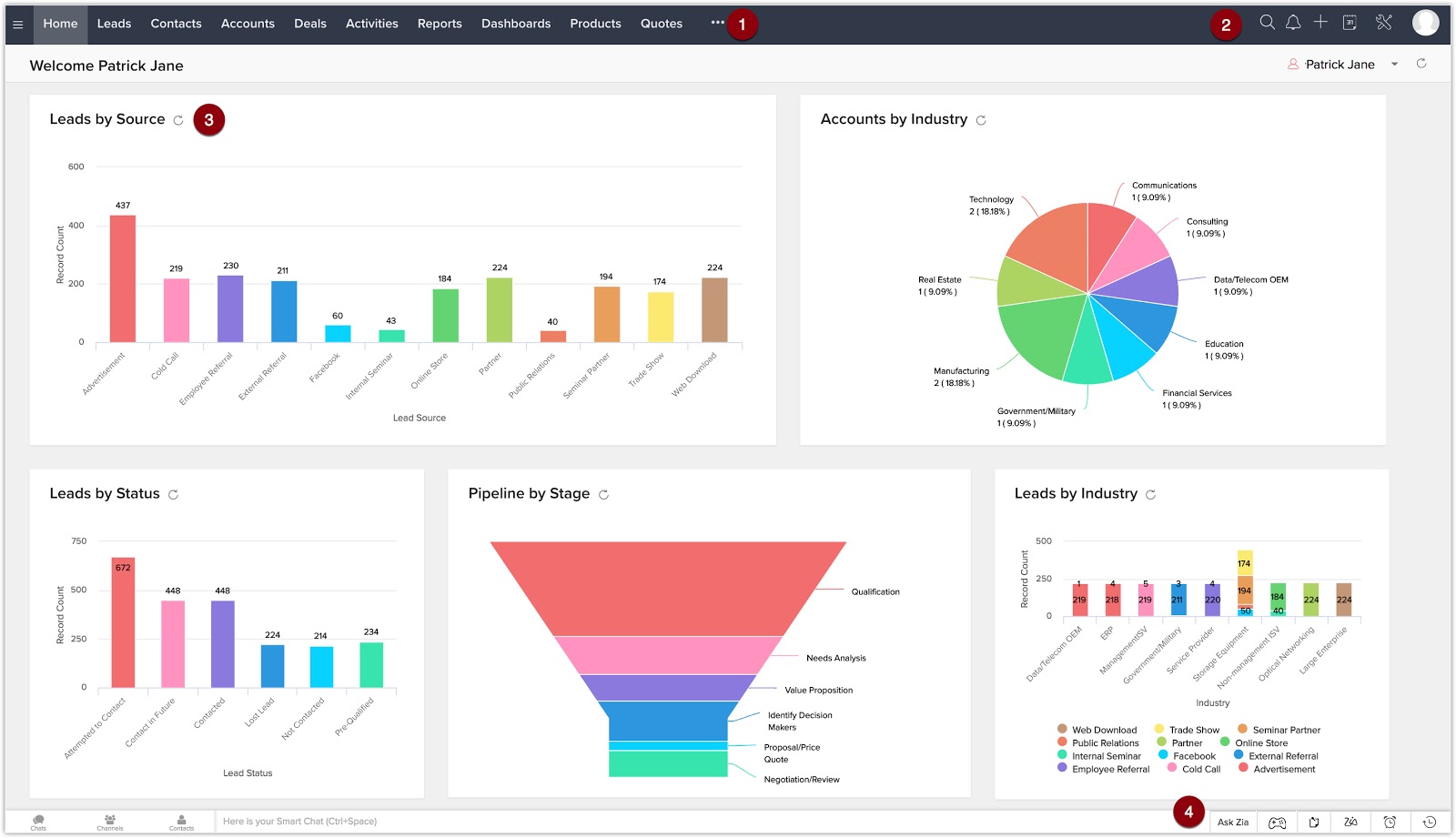
Why is Zoho a “best CRM for small business” candidate?
Crowned “Best CRM of 2020” by Software World, Zoho helps small business owners build lasting customer relationships.
With a global network of over 150,000 businesses in 180 countries, it’s safe to say that this is another top contender for your customer relationship management system.
You can keep up sales momentum with clients from anywhere in the world using built-in remote meeting features, reach customers on every device and channel via omni-channel communication, and easily automate your lead nurturing processes and sales.
Pricing:
Zoho has a free plan for up to 3 users. More powerful features are available on their paid plans, which start at $12/month per user (billed annually).
Core features:
- Omnichannel contact management (email, phone, live chat, and social media)
- Sales lead management (with lead scoring) so you can prioritize leads and convert them faster
- Real-time sales analytics and insights
- Predictive sales forecasting and intelligence via Zia, Zoho’s AI assistant
- Remote-ready features like on-the-go analytics, team collaboration with crystal clear audio & video, and the ability to run meetings directly from within the Zoho CRM
What could be improved:
To get access to workflow automation, you’ll need to opt for the Professional Tier ($20/month per user, billed annually). Zoho’s CRM would could also be improved by making some of the customizable features easier for users to set up.
The sheer amount of customization small businesses can accomplish with the Zoho CRM can be overwhelming and can take a while to get used to. This probably means you’ll be spending more time than you’d like to with customer support.

Why is Drip a “best CRM for small business” candidate?
Drip has built what they call the world’s first ECRM (a CRM platform made specifically for ecommerce).
Their main selling point is that they help you personalize the entire sales pipeline so that you can maximize sales, repeat purchases, and customer value.
This CRM software makes automation a breeze with a wide range of customizable templates for powerful email campaigns.
It also offers simple list segmentation, powerful purchase intent marketing, and of course, hassle-free integrations with popular 3rd party services like Shopify, WooCommerce, and more.
Pricing:
There’s no free plan or free trial. Plans start at $19/month per user for 100 active contacts and go up incrementally. With the cheapest plan, you get unlimited email sends and 24/7 chat & email support.
Core features:
- Targeted, contextual marketing automation to help you build more intimacy with each customer
- Sophisticated tracking code that allows you to piece together hundreds of data points into coherent action points
- KPIs made for ecommerce businesses
- Advanced contact management for sales teams using tags, custom fields, and events
What could be improved:
The reporting options available for Drip leave much to be desired compared to their competitors. The interface can be a little buggy and sluggish at times.
Also, the steep price increases as you grow your contact list can be enough to put some people off.
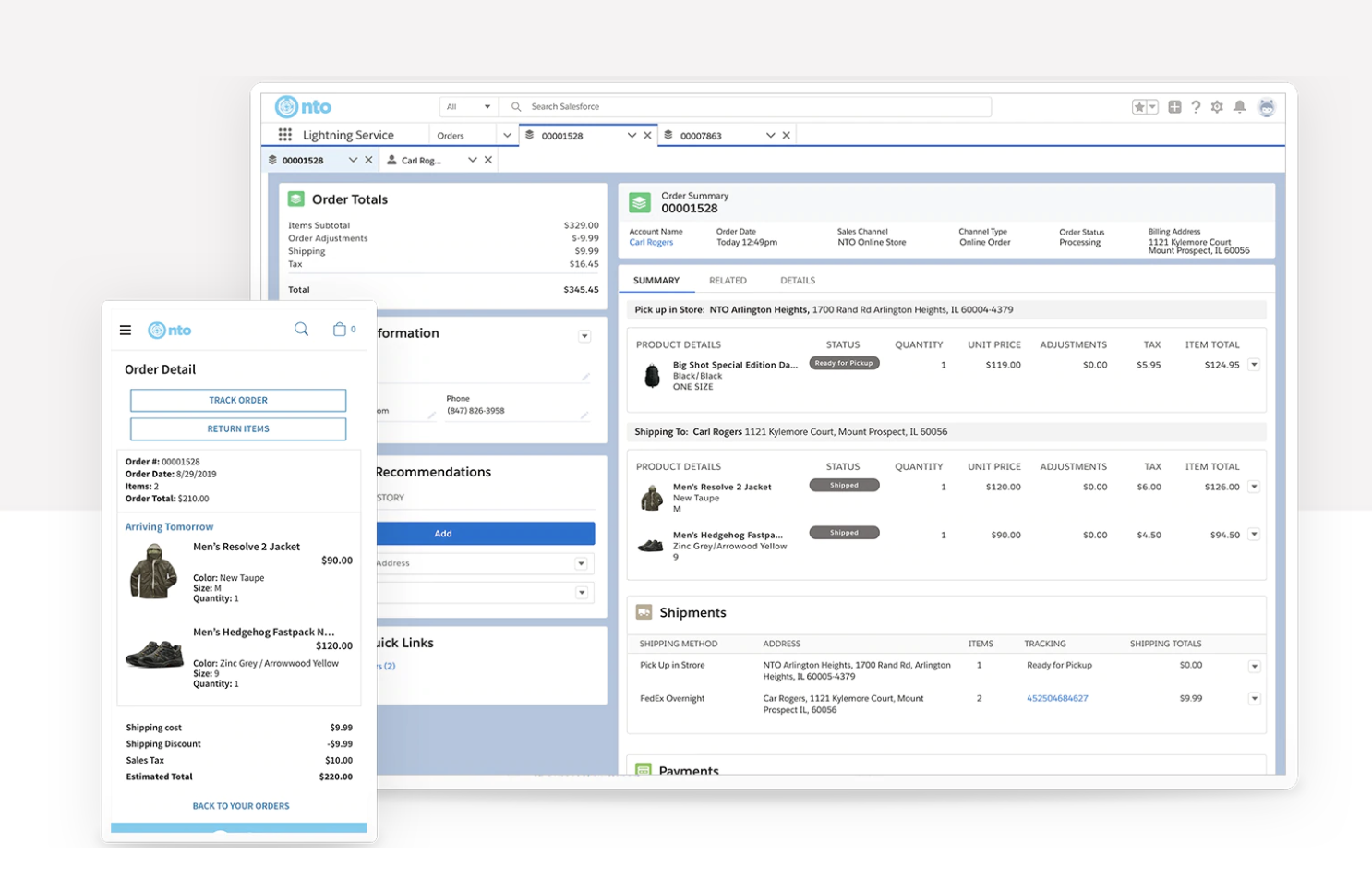
Why is Salesforce a “best CRM for small business” candidate?
Salesforce is a giant in the CRM solutions game and one of the top picks for businesses of all kinds.
Whether you want to create personalized messages for your leads throughout the sales pipeline or have targeted SMS campaigns, you can do it all with Salesforce. You can integrate lots of handy tools with Salesforce easily and quickly. For instance, you can sync Snowflake to Salesforce within minutes and have all your prospects under one roof.
As a veteran tech company with one of the most robust CRMs available, Salesforce is a safe bet for small business owners.
Pricing:
Plans for small businesses start at $25/month per user (billed annually).
Core features:
- Custom dashboards and reports for your sales teams
- The ability to automatically track emails and meetings for deal management
- Social media and email support
- Enterprise-level security and ongoing support
What could be improved:
Because of its robust capabilities, the Salesforce centralized CRM platform can be easy to over-customize, which can do more harm than good. Leveraging all of the CRM features offered by Salesforce can take up valuable time that could have been spent growing your business in other ways.
There’s a bit of a learning curve with such a behemoth CRM, and it might not be worth it if you’re looking for more basic functions.
Here are some of the best Salesforce alternatives you can try.
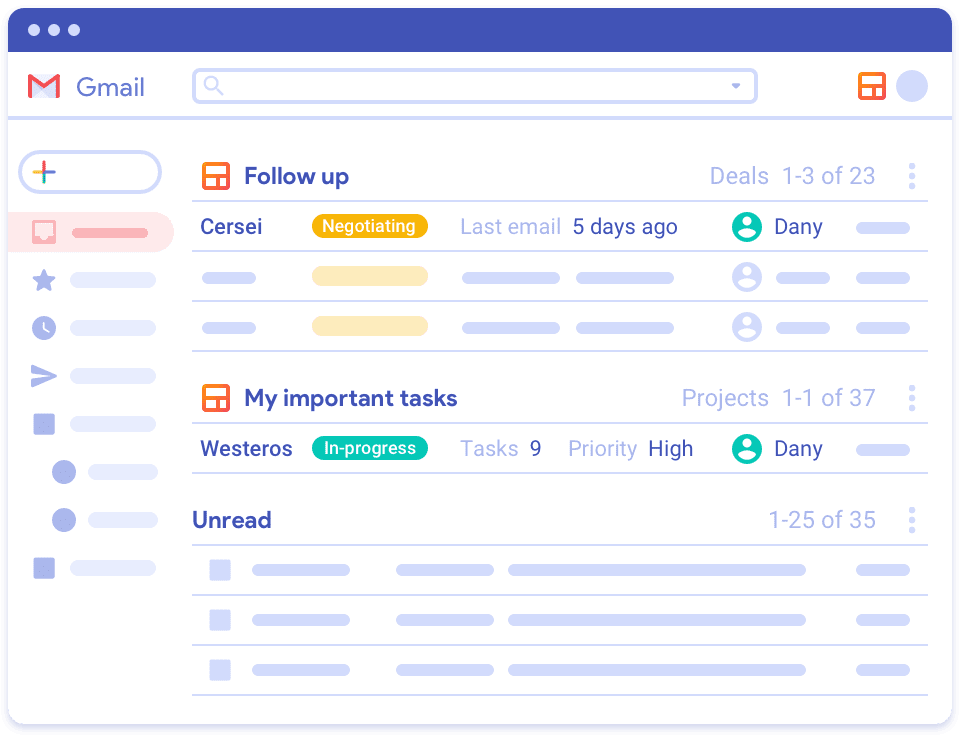
Why is Streak a “best CRM for small business” candidate?
Not every small business owner likes dealing with separate platforms, since jumping between them can sap energy and get them out of their workflow. Some prefer platforms that are embedded in tools they already use daily.
If you’re someone who lives in your inbox, you’ll definitely love the Streak CRM for Gmail.
This extension takes less than 30 seconds to install and comes loaded with handy pipelines like products, follow-ups, sales, orders, support, and more.
Its drag-and-drop-style layout is not as sexy as some of the others mentioned on this list, but that’s the point. It’s a basic CRM made for efficiency and simplicity.
Pricing:
Free for two users, from $49/month per user for their paid plan.
Core features:
- Track all your contacts in a sales pipeline (with custom views)
- Track and share customer interactions with your team
- Easily import and export customer data
- Mobile apps help you stay connected, track calls, and take notes from anywhere
What could be improved:
One of the big marks against Streak CRM is that it only works for Gmail. If you use another email provider, you won’t be able to use Streak as a small business CRM.
The second is its compact size (it is an extension, after all). It lacks many of the features full-fledged CRM services offer.

Why is Agile CRM a “best CRM for small business” candidate?
Agile CRM is another excellent choice for small business owners. One of the biggest positives for Agile CRM is that it’s an affordable, all-in-one solution.
You get contact management, sales, marketing, automation, and customer service in one easy-to-use tool. There is a single-page contact management, 1-click appointment scheduling, and a robust arsenal of marketing and sales tools that can help grow your business.
Pricing:
Agile CRM offers a limited free plan. Paid plans start at $9.99/month per user (billed annually). There’s also an option to prepay for 2 years at a discount.
Core features:
- 1-click calling, call scripts, and automated voicemail
- Fully integrated marketing automation (create landing pages and web forms)
- Multichannel campaigns created and managed with a drag-and-drop interface
- Advanced lead tracking and reporting
What could be improved:
Some small businesses have mentioned that you only receive access to unbranded emails after sending 5,000 emails. This is also the case when you’re on the paid plan, not just the free plan.
Unbranded emails are the standard and this kind of “hidden” cost is a nuisance. Support and functionality have come under criticism as well, for unresponsiveness and lack of customization, respectively.
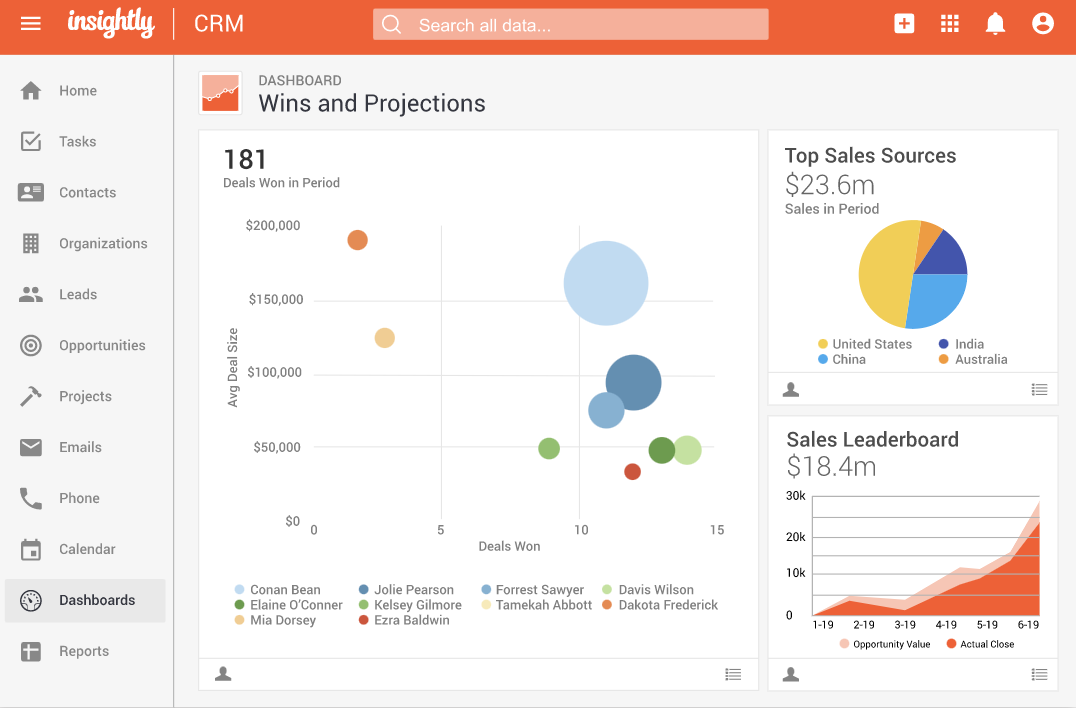
Why is Insightly a “best CRM for small business” candidate?
Need to keep an eye on sales and project management that are working together?
Insightly offers a perfect CRM software for keeping track of multiple business processes.
The user interface keeps things clean and easy to find in one column. You can quickly access invaluable data via the handy dropdown menu that stores projects, leads, contacts, and more. Visual dashboards for sales and projects are highly customizable, which is definitely a bonus.
Pricing:
Free for two users; from $29/month per user for paid plans.
Core features:
- Project management features and flexible calendaring and events
- Lead routing
- Insightly notes and comments
- Complex workflow automation builder
- Embedded EU/US privacy shield and compliance
What could be improved:
The note refresh lags, which can be frustrating when working with a team because it creates unintentional lapses in communication.
Final words
Choosing a CRM solution for your particular business needs can be tough. There are so many options out there and every one is promising something exciting. At the end of the day, finding the right one for you is all about considering your goals, your budget, and your team.
Hopefully, this article gave you some clarity about the high performers in the CRM software world.
This is by no means an exhaustive list covering every single feature, but it should give you enough information about powerful customer relationship management tools to get you started. And with the right CRM solution, you’ll be able to take your business to the next level!
Are you using any of the CRM solutions mentioned in the article? Any recommendations you want to add to the list? Drop a comment below!
